Fleurs du Mal Magazine


Or see the index
Vintage Readers are a perfect introduction to some of the great modern writers: The celebrated bestselling author of The House on Mango Street “knows both that the heart can be broken and that it can rise and soar like a bird.
 Whatever story she chooses to tell, we should be listening for a long time to come” (The Washington Post Book World).
Whatever story she chooses to tell, we should be listening for a long time to come” (The Washington Post Book World).
A winner of the PEN/Nabokov Award for Achievement in International Literature and the prestigious MacArthur Fellowship, Sandra Cisneros evokes working-class Latino experience with an irresistible mix of realism and lyrical exuberance.
Vintage Cisneros features an excerpt from her bestselling novel The House on Mango Street, which has become a favorite in school classrooms across the country.
Also included are a chapter from her novel, Caramelo; a generous selection of poems from My Wicked Wicked Ways and Loose Woman; and seven stories from her award-winning collection Woman Hollering Creek.
SANDRA CISNEROS is a poet, short story writer, novelist and essayist whose work explores the lives of the working-class. Her numerous awards include NEA fellowships in both poetry and fiction, the Texas Medal of the Arts, a MacArthur Fellowship, several honorary doctorates and national and international book awards, including Chicago’s Fifth Star Award, the PEN Center USA Literary Award, and the National Medal of the Arts awarded to her by President Obama in 2016. Most recently, she received the Ford Foundation’s Art of Change Fellowship, was recognized among The Frederick Douglass 200, and was awarded the PEN/Nabokov Award for Achievement in International Literature.
Her classic, coming-of-age novel, The House on Mango Street, has sold over six million copies, has been translated into over twenty languages, and is required reading in elementary, high school, and universities across the nation.
In addition to her writing, Cisneros has fostered the careers of many aspiring and emerging writers through two non-profits she founded: the Macondo Foundation and the Alfredo Cisneros del Moral Foundation. She is also the organizer of Los MacArturos, Latino MacArthur fellows who are community activists. Her literary papers are preserved in Texas at the Wittliff Collections at Texas State University.
Sandra Cisneros is a dual citizen of the United States and Mexico and earns her living by her pen. She currently lives in San Miguel de Allende.
Vintage Readers
By Sandra Cisneros
Publisher: Vintage
Series: Vintage Readers
Language: English
2004
Pages: 208
ISBN: 9781400034055
ISBN-10: 1400034051
paperback
$12.95
• fleursdumal.nl magazine
More in: #Short Stories Archive, - Book News, - Bookstores, Archive C-D
Het Incident
Geachte Heer en Mevrouw Waasdorp,
Via deze weg wil ik graag nog even terugkomen op het incident van 13 november jongstleden.
Het spijt ons –ik moet hier specifiek Mevr. Van Eeken, onze gewaardeerde docent Aardrijkskunde, ook niet onbenoemd laten- ten zeerste dat wat begon als een klein voorval, zo uit de hand kon lopen. In het verlengde hiervan doet het ons zeer veel verdriet dat de schorsing van uw zoon Wesley dan ook niet vermeden kon worden.
Als school staan we ontegenzeggelijk voor goed onderwijs, maar vooral ook voor inclusie, we vormen immers het voorportaal van de maatschappij. Het feit dat Wesley in zijn periode van schorsing niet deel kan nemen aan het onderwijs –en in feite dus aan de maatschappij – raakt óók ons diep in ons onderwijshart.
In het gesprek wat we 15 november hebben gevoerd op school was er achteraf gezien iets teveel emotie om objectief te bespreken wat er nou daadwerkelijk was gebeurd. Om die reden vinden we het belangrijk om middels deze brief enkele –in onze bescheiden optiek- onderbelichte aspecten nog eens aan te stippen.
Laat ik voorop stellen dat Wesley een immer aanwezige leerling is binnen de muren van onze scholengemeenschap. Een energieke jongen die door docenten vooral omschreven wordt als vindingrijk en sociaal georiënteerd. Iemand die zelden tot nooit ziek is en nooit te beroerd is om zijn mening in de klas te geven. Iets wat wij als voorstanders van dialoog en debat alleen maar kunnen toejuichen.
Natuurlijk, hij is wel eens betrokken geweest bij vechtpartijen, pesterijen, enkele bewezen gevallen van fraude bij schoolexamens en drugshandel op school. Maar laten we geen oude koeien uit de sloot halen. Voor het laatste heeft hij overigens zijn straf al gehad toen hij drie maanden in detentie zat in Sassenheim. Ook toen was Wesley een lange periode verstoken van (goed) onderwijs. In dat opzicht kunnen we stellen dat de huidige situatie ons des te meer zorgen baart.
Ik kan me niet voorstellen dat Wesley thuis wel inzet toont en een wezenlijke bijdrage aan bijvoorbeeld het huishouden levert. Zelfs een bordje naar de keuken brengen is waarschijnlijk al teveel gevraagd. Op school herkennen we dat wel. Als we hem vriendelijk vragen om een geleend boek terug te leggen in de kast wenst hij ons steevast allerhande ziektes toe, waarbij we vooral de rattentyfus en de grafebola niet onbenoemd willen laten. Wenst hij u deze creatieve ziektes ook toe als u hem vraagt een kommetje kerriesoep weer op het aanrecht te zetten? Van meehelpen in het huishouden kan geen sprake zijn. U zou het eigenlijk beter tegenwerken van het huishouden kunnen noemen als u eerlijk bent. Dat brengt me eigenlijk meteen terug naar de kern: Eerlijkheid. Daar schort het toch wel een beetje aan bij Wesley. Mag ik dat zeggen? De wijze waarop hij de ene na de andere leugen schijnbaar zonder enige moeite tussen zijn ongepoetste tanden door laat glippen, is even onbeschoft als zorgwekkend te noemen. Maar dit terzijde.
Laten we nog even terug gaan naar die bewuste middag vorige week. Ik zal de situatie zo objectief mogelijk trachten te schetsen.
Wesley kwam (wederom) tien minuten te laat in de les bij mevr. Van Eeken. Volgens zijn zeggen was hij vanwege een toiletbezoek te laat. Dat leek Mevr. Van Eeken wat overdreven en zij heeft mij telefonisch op de hoogte gesteld. We hebben polshoogte genomen bij de toiletten op de eerste verdieping en troffen daar op de muur een onrealistisch groot getekende jongeheer aan. Met veel aandacht –als ik een hang naar drama had, zou ik “liefde” zeggen- met zwarte watervaste stift op de muur gekalkt. Precies zo’n marker vonden we in de tas van Wesley. Helemaal bewijzen kunnen we het uiteraard niet maar het riekt er toch wel naar dat Wesley deze kunstuiting op zijn palmares kan schrijven. Op ingeleverd werk vonden we immers tekeningen die ernstige overeenkomsten vertoonden met het kunstwerk in de toiletten. Hier was verder forensisch sporenonderzoek in onze optiek dan ook overbodig. Overigens konden we in het toilet niet de kenmerkende geur van Wesley’s uitwerpselen waarnemen, wat de achterdocht jegens Wesley’s vermeende onschuld deed groeien.
Enfin, Wesley was na deze betichting onzer zijde zo verbolgen dat er geen spreekwoordelijk land meer mee te bezeilen was. De woorden die hij hierbij gebruikte kan ik lastig herhalen, maar kwamen er op neer dat Mevr. Van Eeken de betreffende marker in haar vleesportemonnee kon opbergen. Volgens Mevrouw Van Eeken was dit verzoek gekoppeld aan een irreëel verwachtingspatroon en leek bovendien fysiek onhaalbaar gezien de medische status van Mevrouw Van Eeken. Wesley maakte hier op onvolwassen wijze misbruik van de uitgelekte kennis betreffende mevrouw Van Eeken’s recente operatie in de onderste regionen. Hoewel uitgelekt hier misschien een onhandig gekozen term is.
Toegegeven, iedereen verdient een tweede kans, maar over een eventuele zesentwintigste kans zijn de kaarten wat mij betreft nog niet geschud. Ik heb hier echter weinig over te zeggen zolang het Bestuur van mening is dat we leerlingen niet kunnen verwijderen voordat we op zijn minst van doodslag kunnen spreken. Ik kan wel verklappen dat het voltallige docentencorps er in hoge mate tegenop ziet om het kadaver dat Wesley genoemd wordt, weer met zijn beschimmelde blik door het schoolgebouw te zien struinen. Wat hij hier komt halen weet dan ook geen mens. Het zou mooi zijn als er een beroep zou zijn waar het tekenen van strakke plassers tot de kerntaken behoort, maar zolang dat er niet is, zien we het somber in wat betreft de toekomstkansen van Wesley.
Ik zou deze brief kunnen besluiten met de verwachting uit te spreken dat het vanaf nu anders zal gaan, maar we weten allemaal wel beter. Waarschijnlijk spreken we elkaar binnen luttele dagen om het volgende incident te bespreken. We kunnen enkel hopen dat jullie dan als gezin iets meer gewassen ten tonele zult verschijnen. De exotische mengeling van even grote delen knoflook, opgedroogd zweet en iets wat ik enkel kan omschrijven als menselijke ontlasting, is vrees ik in het leer van onze fauteuils getrokken om erin te blijven wonen.
Hoogachtend,
Drs. J. Schuddetrut
Rector O.S.G. Balthasar Gerards
Tekst: Thomas van der Vliet
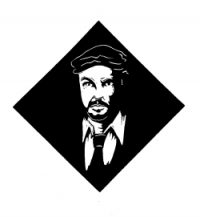 Thomas van der Vliet is van oorsprong een muzikant. Hij heeft met zijn band The Bullfight in 2022 nationaal hoge ogen gegooid (**** – Volkskrant) met het spoken word album Some Divine Gift, waarbij hij gedichten en korte verhalen van onder andere Barry Hay, Spinvis, Alex Roeka en David Boulter (Tindersticks) op muziek heeft gezet.
Thomas van der Vliet is van oorsprong een muzikant. Hij heeft met zijn band The Bullfight in 2022 nationaal hoge ogen gegooid (**** – Volkskrant) met het spoken word album Some Divine Gift, waarbij hij gedichten en korte verhalen van onder andere Barry Hay, Spinvis, Alex Roeka en David Boulter (Tindersticks) op muziek heeft gezet.
Als schrijver was Van der Vliet eerder betrokken bij educatieve uitgaven (Uitgeverij SWP) en als scenarist voor een korte film voor het Rotterdams Film Festival.
In 2024 verschijnt zijn romandebuut Het Interview via Uitgeverij Studio Kers. Naast de gedrukte versie zal een audioboek beschikbaar komen, ingesproken door muzikant Alex Roeka en van soundtrack voorzien door Van der Vliet’s band The Bullfight.
(linosnede door Hélène Bautista)
• fleursdumal.nl magazine
More in: # Music Archive, #Short Stories Archive, Archive U-V
Le Yalou
Civilization, according to the interpretation of the
Occident, serves only to satisfy men of large desires.
Vicomte Torio.
En septembre mil huit cent quatre-vingt-quinze, et en Chine, un jour bleu et blanc, le lettré me conduisit à un phare de bois noir, sur le sable du rivage.
Nous quittâmes les derniers bosquets. Nous marchâmes, dormants, assoupis par la paresse du sol en poudre fondante, par qui étaient bus nos efforts, et qui descendait sous nos pas. Nous quittâmes le sable, enfin. Je regardai, en résumé, la vague trace de notre chemin se tordre et fuser sur la plage. Je vis dans les jambes du phare cligner la lumière de l’eau.
 A chaque marche, nous devenions plus légers, et nous respirions et nous voyions davantage. Vers la mi-hauteur, nous devînmes plus lourds. Un vent plein et bien tendu se mit heureusement à exister : il a tâtonné les barres de bois tièdes à travers la soie se gonflant de la robe du Chinois. La mer monte avec nous.
A chaque marche, nous devenions plus légers, et nous respirions et nous voyions davantage. Vers la mi-hauteur, nous devînmes plus lourds. Un vent plein et bien tendu se mit heureusement à exister : il a tâtonné les barres de bois tièdes à travers la soie se gonflant de la robe du Chinois. La mer monte avec nous.
Toute la vue nous vint comme un frais aliment. Là-haut, il faisait si bon que nous sentîmes bientôt un petit besoin à satisfaire. Au bout d’un temps indifférent, la douce égalité du mouvement, du calme nous saisit.
La mer, qui me remuait tendrement, me rendait facile. Elle emplissait tout le reste de ma vie, avec une grande patience qui me faisait plaisir elle m’usait, je me sentais devenir régulier.
Les ondes, tournant sans peine, me donnaient la sensation de fumer, après avoir beaucoup fumé, et de devoir fumer infiniment encore. C’est alors que le souvenir édulcoré de maintes choses importantes passa aisément dans mon esprit : je sentis une volupté principale à y penser avec indifférence ; je souris à l’idée que ce bien-être pouvait éliminer certains erreurs, et m’éclairer.
Donc . . . Et je baissai mes paupières, ne voyant plus de la brillante mer que ce qu’on voit d’un petit verre de liqueur dorée, portée aux yeux. Et je fermai les yeux. Les sons de la promenade de l’eau me comblaient.
J’ignore comment vint à mon compagnon un désir de parler et de vaincre l’air délicieux, l’oubli. Je me disais : Que va-t-il dire ? aux premiers mots obscurs.
– Nippon, dit-il, nous faire la guerre. Ses grands bateaux blancs fument dans nos mauvais rêves. Ils vont troubler nos golfes. Ils feront des feux dans la nuit paisible.
– Ils sont très forts, soupirai-je, ils nous imitent.
– Vous êtes des enfants, dit le Chinois, je connais ton Europe.
– En souriant tu l’as visitée.
– J’ai peut-être souri. Sûrement, à l’ombre des autres regards, j’ai ri. La figure que je me vois seul, riait abondamment, tandis que les joyeux moqueurs qui me suivaient et me montraient du doigt n’auraient pu supporter la réflexion de leur propre vie. Mais je voyais et je touchais le désordre insensé de l’Europe. Je ne puis même pas comprendre la durée, pourtant bien courte, d’une telle confusion. Vous n’avez ni la patience qui tisse les longues vies, ni le sentiment de l’irrégularité, ni le sens de la place la plus exquise d’une chose, ni la connaissance du gouvernement. Vous vous épuisez à recommencer sans cesse l’œuvre du premier jour. Vos pères ainsi sont deux fois morts, et vous, vous avez peur de la mort.
« Chez vous, le pouvoir ne peut rien. Votre politique est faite de repentirs, elle conduit à des révolutions générales, et ensuite aux regrets des révolutions, qui sont aussi des révolutions. Vos chefs ne commandent pas, vos hommes libres travaillent, vos esclaves vous font peur, vos grands hommes baisent les pieds des foules, adorent les petits, ont besoin de tout le monde. Vous êtes livrés à la richesse et à l’opinion féroces. Mais touche de ton esprit la plus exquise de vos erreurs.
« L’intelligence, pour vous, n’est pas une chose comme les autres. Elle n’est ni prévue, ni amortie, ni protégée, ni réprimée, ni dirigée; vous l’adorez comme une bête prépondérante. Chaque jour elle dévore ce qui existe. Elle aimerait à terminer chaque soir un nouvel état de société. Un particulier qu’elle enivre, compare sa pensée aux décisions des lois, aux faits eux-mêmes, nés de la foule et de la durée : il confond le rapide changement de son cœur avec la variation imperceptible des formes réelles et des Êtres durables. (Durant une fleur, mille désirs ont existé ; mille fois, on a pu jouir d’avoir trouvé le défaut de la corolle… mille corolles qu’on a crues plus belles ont été coloriées dans l’esprit, mais ont disparu…) C’est par cette loi que l’intelligence méprise les lois . . . et vous encouragez sa violence ! Vous en êtes fous jusqu’au moment de la peur. Car vos idées sont terribles et vos cœurs faibles. Vos pitiés, vos cruautés sont absurdes, sans calme, comme irrésistibles. Enfin, vous craignez le sang, de plus en plus. Vous craignez le sang et le temps.
« Cher barbare, ami imparfait, je suis un lettré du pays de Thsin, près de la mer Bleue. Je connais l’écriture, le commandement à la guerre, et la direction de l’agriculture. Je veux ignorer votre maladie d’inventions et votre débauche de mélange d’idées. Je sais quelque chose de plus puissant. Oui, nous, hommes d’ici, nous mangeons par millions continuels, les plus favorables vallées de la terre ; et la profondeur de ce golfe immense d’individus garde la forme d’une famille ininterrompue depuis les premiers temps. Chaque homme d’ici se sent fils et père, entre le mille et le dix mille, et se voit saisi dans le peuple autour de lui, et dans le peuple mort au-dessous de lui, et dans le peuple à venir, comme la brique dans le mur de briques. Il tient. Chaque homme d’ici sait qu’il n’est rien sans cette terre pleine, et hors de la merveilleuse construction d’ancêtres. Au point où les aïeux pâlissent, commencent les foules des Dieux. Celui qui médite peut mesurer dans sa pensée la belle forme et la solidité de notre tour éternelle.
« Songe à la trame de notre race ; et, dis-moi, vous qui coupez vos racines et qui desséchez vos fleurs, comment existez-vous encore ? Sera-ce longtemps?
« Notre empire est tissu de vivants et de morts et de la nature. Il existe parce qu’il arrange toutes les choses. Ici, tout est historique : une certaine fleur, la douceur d’une heure qui tourne, la chair délicate des lacs entrouverts par le rayon, une éclipse émouvante… Sur ces choses, se rencontrent les esprits de nos pères avec les nôtres. Elles se reproduisent et, tandis que nous répétons les sons qu’ils leur ont donnés pour noms, le souvenir nous joint à eux et nous éternise.
« Tels, nous semblons dormir et nous sommes méprisés. Pourtant, tout se dissout dans notre magnifique quantité. Les conquérants se perdent dans notre eau jaune. Les armées étrangères se noient dans le flux de notre génération, ou s’écrasent contre nos ancêtres. Les chutes majestueuses de nos fleuves d’existences et la descente grossissante de nos pères les emportent.
« Ils nous faut donc une politique infinie, atteignant les deux fonds du temps, qui conduisent mille millions d’hommes, de leurs pères à leurs fils, sans que les liens se brisent ou se brouillent. Là est l’immense direction sans désir. Vous nous jugez inertes. Nous conservons simplement la sagesse suffisante pour croître démesurément, au-delà de toute puissance humaine, et pour vous voir, malgré votre science furieuse, vous fondre dans les eaux pleines du pays du Thsin. Vous qui savez tant de choses, vous ignorez les plus antiques et les plus fortes, et vous désirez avec fureur ce qui est immédiat, et vous détruisez en même temps vos pères et vos fils.
« Doux, cruels, subtils ou barbares, nous étions ce qu’il faut à son heure. Nous ne voulons pas savoir trop. La science des hommes ne doit pas s’augmenter indéfiniment. Si elle s’étend toujours, elle cause un trouble incessant et elle se désespère elle-même. Si elle s’arrête, la décadence paraît. Mais, nous qui pensons à une durée plus forte que la force de l’Occident, nous évitons l’ivresse dévorante de sagesse. Nous gardons nos anciennes réponses, nos Dieux, nos étages de puissance. Si l’on n’avait conservé aux supérieurs, l’aide inépuisable des incertitudes de l’esprit, si, en détruisant la simplicité des hommes, on avait excité le désir en eux, et changé la notion qu’ils ont d’eux-mêmes – si les supérieurs étaient restés seuls dans une nature devenue mauvaise, vis-à-vis du nombre effrayant des sujets et de la violence des désirs – ils auraient succombé, et avec eux, toute la force de tout le pays. Mais notre écriture est trop difficile. Elle est politique. Elle renferme les idées. Ici, pour pouvoir penser, il faut connaître des signes nombreux ; seuls y parviennent les lettrés, au prix d’un labeur immense. Les autres ne peuvent réfléchir profondément, ni combiner leurs informes desseins. Ils sentent, mais le sentiment est toujours une chose enfermée. Tous les pouvoirs contenus dans l’intelligence restent donc aux lettrés, et un ordre inébranlable se fonde sur la difficulté et l’esprit.
« Rappelle-toi maintenant que vos grandes inventions eurent chez nous leur germe. Comprends-tu désormais pourquoi elles n’ont pas été poursuivies ? Leur perfection spéciale eût gâté notre lente et grande existence en troublant le régime simple de son cours. Tu vois qu’il ne faut pas nous mépriser, car, nous avons inventé la poudre, pour brandir, le soir, des fusées.
Je regarde. Le Chinois était déjà très petit sur le sable, regagnant les bosquets de l’intérieur. Je laisse passer quelques vagues. J’entends le mélange de tous les oiseaux légèrement bouillir dans la brise ou dans une vapeur d’arbustes, derrière moi et loin. La mer me soigne.
A quoi penser ? Pensai-je ? Que reste-t-il à saisir ? Où repousser ce qui maintenant me caresse, satisfaisant, habile, aisé ? Se mouvoir, en goûtant certaines difficultés, là-dedans, dans l’air ?… Tu me reposes, simple idée de me transporter si haut, et, au moindre élan, si près de toute pointe de vague qui crève ; ou d’arriver vers chaque chose infiniment peu désirée, avec nul effort, un temps imperceptible selon d’immenses trajets, amusants par eux-mêmes, si faciles, et revenir. Je suis attiré ; dans ce calme, ma plus petite idée se corrige, en se laissant, dans tout l’espace, se satisfaire, en improvisant tout de suite son exécution parfaite et le plaisir de se contenter qui la termine. Elle meurt chaque fois, ayant d’elle-même rétabli l’ensemble antérieur. Mais toute autre l’imite, et s’épuise pareille, voluptueusement, car le groupe de lumière et pensée qui dans ce moment me constitue, demeure encore identique. Alors, le changement est nul. Le temps ne marche plus. Ma vie se pose.
Presque rien ne me le fait sentir, puisque je reconquiers à chaque minute la précédente ; et mon esprit voltige à tous les points d’ici. Tout ce qui est possible est becqueté… Si tous les points de l’étendue d’ici se confondent successivement – si je puis en finir si vite avec ce qui continue –, si cette eau brillante qui tourne et s’enfonce comme une vis brillante dans le lointain de ma gauche –, si cette chute de neige dorée, mince, posée au large, en face . . .
Désormais, ouverte comme une huître, la mer me rafraîchit au soleil par l’éclat de sa chair grasse et humide : j’entends aussi l’eau, tout près, boire longuement, ou, dans les bois du phare, sauter à la corde, ou faire un bruit de poules.
Pour mieux l’écouter, je coupe le regard. Je baisse les paupières, et vois bouger bientôt deux ou trois petites fenêtres lumineuses, précieuses : des lunules orangées qui se contractent et sont sensibles ; une ombre où elles battent et m’aveuglent moi-même. Je veux reconstruire alors toute la vue que je viens de clore ; j’appelle les bleus nombreux, et les lignes fermées du tissu simple étendu sur une chose tremblante ; je fais une vague qui bouffe et qui m’élève . . .
Je n’en puis faire mille. Pourquoi ? Et la mer que je formais, disparaît. Déjà, je raisonne, et je trouve.
Rouvrons. Revenons au jour fixe. Ici il faut se laisser faire.
Les voilà toutes. Elles se roulent : je me roule. Elles murmurent je parle. Elles se brisent en fragments, elles se lèchent, elles retournent, elles flottent encore, elles moussent et me laissent mourant sur un sable baisé. Je revis au lointain dans le premier bruit du moindre qui ressuscite, au seuil du large. La force me revient. Nager contre elles – non, nager sur elles –, c’est la même chose ; debout dans l’eau où les pieds se perdent, le cœur en avant, les yeux fondus sans poids, sans corps . . .
L’individu, alors, sent profondément sa liaison avec ce qui se passe sous ses yeux, l’eau. (Paul Valéry, 1895)
Paul Valéry
(1871-1945)
Le Yalou
• fleursdumal.nl magazine
More in: #Short Stories Archive, Archive U-V, Archive U-V, Valéry, Paul
The 2022 Nobel prize in literature has been awarded to Annie Ernaux “for the courage and clinical acuity with which she uncovers the roots, estrangements and collective restraints of personal memory”.
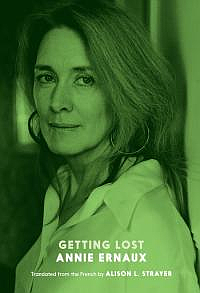 Ernaux, who writes novels about daily life in France as well as non-fiction and is one of her country’s most acclaimed authors, had been among the favourites to win the prize.
Ernaux, who writes novels about daily life in France as well as non-fiction and is one of her country’s most acclaimed authors, had been among the favourites to win the prize.
Ernaux is the first French writer to win the Nobel since Patrick Modiano in 2014. She becomes the 16th French writer to have won the Nobel to date.
Anders Olsson, chair of the Nobel committee, said that in her work, “Ernaux consistently and from different angles, examines a life marked by strong disparities regarding gender, language and class”.
Ernaux was born in 1940 and grew up in the small town of Yvetot in Normandy. She studied at Rouen University, and later taught at secondary school.
From 1977 to 2000, she was a professor at the Centre National d’Enseignement par Correspondance. Olsson said her “path to authorship was long and arduous”.
 Works
Works
Les Armoires vides, Paris, Gallimard, 1974; Gallimard, 1984.
Ce qu’ils disent ou rien, Paris, Gallimard, 1977; French & European Publications, Incorporated.
La Femme gelée, Paris, Gallimard, 1981; French & European Publications, Incorporated, 1987.
La Place, Paris, Gallimard, 1983; Distribooks Inc, 1992.
Une Femme, Paris, Gallimard, 1987.
Passion simple, Paris, Gallimard, 1991; Gallimard, 1993.
Journal du dehors, Paris, Gallimard, 1993.
La Honte, Paris, Gallimard, 1997.
Je ne suis pas sortie de ma nuit, Paris, Gallimard, 1997.
La Vie extérieure : 1993-1999, Paris, Gallimard, 2000.
L’Événement, Paris, Gallimard, 2000.
Se perdre, Paris, Gallimard, 2001.
L’Occupation, Paris, Gallimard, 2002.
L’Usage de la photo, with Marc Marie, Paris, Gallimard, 2005.
Les Années, Paris, Gallimard, 2008.
L’Autre fille, Paris, Nil 2011.
L’Atelier noir, Paris, éditions des Busclats, 2011.
Écrire la vie, Paris, Gallimard, 2011.
Retour à Yvetot, éditions du Mauconduit, 2013.
Regarde les lumières mon amour, Seuil, 2014.
Mémoire de fille, Gallimard, 2016.
Hôtel Casanova, Gallimard Folio, 2020.
Le jeune homme, Gallimard, 2022.
• fleursdumal.nl magazine
More in: #Short Stories Archive, - Book Lovers, Annie Ernaux, Archive E-F, Art & Literature News, Awards & Prizes
The Great Bear
by Leo Tolstoy
A long, long time ago there was a big drought on the earth. All the rivers dried up and the streams and wells, and the trees withered and the bushes and grass, and men and beasts died of thirst.
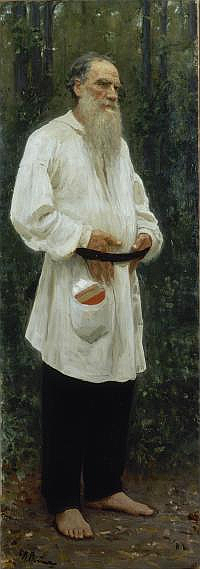 One night a little girl went out with a pitcher to find some water for her sick mother. She wandered and wandered everywhere, but could find no water, and she grew so tired that she lay down on the grass and fell asleep. When she awoke and took up the pitcher she nearly upset the water it contained. The pitcher was full of clear, fresh water. The little girl was glad and was about to put it to her lips, but she remembered her mother and ran home with the pitcher as fast as she could. She hurried so much that she did not notice a little dog in her path; she stumbled over it and dropped the pitcher. The dog whined pitifully; the little girl seized the pitcher.
One night a little girl went out with a pitcher to find some water for her sick mother. She wandered and wandered everywhere, but could find no water, and she grew so tired that she lay down on the grass and fell asleep. When she awoke and took up the pitcher she nearly upset the water it contained. The pitcher was full of clear, fresh water. The little girl was glad and was about to put it to her lips, but she remembered her mother and ran home with the pitcher as fast as she could. She hurried so much that she did not notice a little dog in her path; she stumbled over it and dropped the pitcher. The dog whined pitifully; the little girl seized the pitcher.
She thought the water would have been upset, but the pitcher stood upright and the water was there as before. She poured a little into the palm of her hand and the dog lapped it and was comforted. When the little girl again took up the pitcher, it had turned from common wood to silver. She took the pitcher home and gave it to her mother.
The mother said, “I shall die just the same; you had better drink it,” and she handed the pitcher to the child. In that moment the pitcher turned from silver to gold. The little girl could no longer contain
herself and was about to put the pitcher to her lips, when the door opened and a stranger entered who begged for a drink. The little girl swallowed her saliva and gave the pitcher to him.
And suddenly seven large diamonds sprang out of the pitcher and a stream of clear, fresh water flowed from it. And the seven diamonds began to rise, and they rose higher and higher till they reached the sky and became the Great Bear.
Short Stories
The Great Bear by Leo Lolstoy (1828-1910)
From: Tolstoi for the young. Select tales from Tolstoi
Translator: R. S. Townsend (1916)
• fleursdumal.nl magazine
More in: #Short Stories Archive, Archive S-T, Tolstoy, Leo
God Sees the Truth, But Waits
by Leo Tolstoy
In the town of Vladimir lived a young merchant named Ivan Dmitrich Aksionov. He had two shops and a house of his own.
Aksionov was a handsome, fair-haired, curly-headed fellow, full of fun, and very fond of singing. When quite a young man he had been given to drink, and was riotous when he had had too much; but after he married he gave up drinking, except now and then.
One summer Aksionov was going to the Nizhny Fair, and as he bade good-bye to his family, his wife said to him, “Ivan Dmitrich, do not start to-day; I have had a bad dream about you.”
Aksionov laughed, and said, “You are afraid that when I get to the fair I shall go on a spree.”
 His wife replied: “I do not know what I am afraid of; all I know is that I had a bad dream. I dreamt you returned from the town, and when you took off your cap I saw that your hair was quite grey.”
His wife replied: “I do not know what I am afraid of; all I know is that I had a bad dream. I dreamt you returned from the town, and when you took off your cap I saw that your hair was quite grey.”
Aksionov laughed. “That’s a lucky sign,” said he. “See if I don’t sell out all my goods, and bring you some presents from the fair.”
So he said good-bye to his family, and drove away.
When he had travelled half-way, he met a merchant whom he knew, and they put up at the same inn for the night. They had some tea together, and then went to bed in adjoining rooms.
It was not Aksionov’s habit to sleep late, and, wishing to travel while it was still cool, he aroused his driver before dawn, and told him to put in the horses.
Then he made his way across to the landlord of the inn (who lived in a cottage at the back), paid his bill, and continued his journey.
When he had gone about twenty-five miles, he stopped for the horses to be fed. Aksionov rested awhile in the passage of the inn, then he stepped out into the porch, and, ordering a samovar to be heated, got out his guitar and began to play.
Suddenly a troika drove up with tinkling bells and an official alighted, followed by two soldiers. He came to Aksionov and began to question him, asking him who he was and whence he came. Aksionov answered him fully, and said, “Won’t you have some tea with me?” But the official went on cross-questioning him and asking him. “Where did you spend last night? Were you alone, or with a fellow-merchant? Did you see the other merchant this morning? Why did you leave the inn before dawn?”
Aksionov wondered why he was asked all these questions, but he described all that had happened, and then added, “Why do you cross-question me as if I were a thief or a robber? I am travelling on business of my own, and there is no need to question me.”
Then the official, calling the soldiers, said, “I am the police-officer of this district, and I question you because the merchant with whom you spent last night has been found with his throat cut. We must search your things.”
They entered the house. The soldiers and the police-officer unstrapped Aksionov’s luggage and searched it. Suddenly the officer drew a knife out of a bag, crying, “Whose knife is this?”
Aksionov looked, and seeing a blood-stained knife taken from his bag, he was frightened.
“How is it there is blood on this knife?”
Aksionov tried to answer, but could hardly utter a word, and only stammered: “I–don’t know–not mine.” Then the police-officer said: “This morning the merchant was found in bed with his throat cut. You are the only person who could have done it. The house was locked from inside, and no one else was there. Here is this blood-stained knife in your bag and your face and manner betray you! Tell me how you killed him, and how much money you stole?”
Aksionov swore he had not done it; that he had not seen the merchant after they had had tea together; that he had no money except eight thousand rubles of his own, and that the knife was not his. But his voice was broken, his face pale, and he trembled with fear as though he went guilty.
The police-officer ordered the soldiers to bind Aksionov and to put him in the cart. As they tied his feet together and flung him into the cart, Aksionov crossed himself and wept. His money and goods were taken from him, and he was sent to the nearest town and imprisoned there. Enquiries as to his character were made in Vladimir. The merchants and other inhabitants of that town said that in former days he used to drink and waste his time, but that he was a good man. Then the trial came on: he was charged with murdering a merchant from Ryazan, and robbing him of twenty thousand rubles.
His wife was in despair, and did not know what to believe. Her children were all quite small; one was a baby at her breast. Taking them all with her, she went to the town where her husband was in jail. At first she was not allowed to see him; but after much begging, she obtained permission from the officials, and was taken to him. When she saw her husband in prison-dress and in chains, shut up with thieves and criminals, she fell down, and did not come to her senses for a long time. Then she drew her children to her, and sat down near him. She told him of things at home, and asked about what had happened to him. He told her all, and she asked, “What can we do now?”
“We must petition the Czar not to let an innocent man perish.”
His wife told him that she had sent a petition to the Czar, but it had not been accepted.
Aksionov did not reply, but only looked downcast.
Then his wife said, “It was not for nothing I dreamt your hair had turned grey. You remember? You should not have started that day.” And passing her fingers through his hair, she said: “Vanya dearest, tell your wife the truth; was it not you who did it?”
“So you, too, suspect me!” said Aksionov, and, hiding his face in his hands, he began to weep. Then a soldier came to say that the wife and children must go away; and Aksionov said good-bye to his family for the last time.
When they were gone, Aksionov recalled what had been said, and when he remembered that his wife also had suspected him, he said to himself, “It seems that only God can know the truth; it is to Him alone we must appeal, and from Him alone expect mercy.”
And Aksionov wrote no more petitions; gave up all hope, and only prayed to God.
Aksionov was condemned to be flogged and sent to the mines. So he was flogged with a knot, and when the wounds made by the knot were healed, he was driven to Siberia with other convicts.
For twenty-six years Aksionov lived as a convict in Siberia. His hair turned white as snow, and his beard grew long, thin, and grey. All his mirth went; he stooped; he walked slowly, spoke little, and never laughed, but he often prayed.
In prison Aksionov learnt to make boots, and earned a little money, with which he bought The Lives of the Saints. He read this book when there was light enough in the prison; and on Sundays in the prison-church he read the lessons and sang in the choir; for his voice was still good.
The prison authorities liked Aksionov for his meekness, and his fellow-prisoners respected him: they called him “Grandfather,” and “The Saint.” When they wanted to petition the prison authorities about anything, they always made Aksionov their spokesman, and when there were quarrels among the prisoners they came to him to put things right, and to judge the matter.
No news reached Aksionov from his home, and he did not even know if his wife and children were still alive.
One day a fresh gang of convicts came to the prison. In the evening the old prisoners collected round the new ones and asked them what towns or villages they came from, and what they were sentenced for. Among the rest Aksionov sat down near the newcomers, and listened with downcast air to what was said.
One of the new convicts, a tall, strong man of sixty, with a closely-cropped grey beard, was telling the others what be had been arrested for.
“Well, friends,” he said, “I only took a horse that was tied to a sledge, and I was arrested and accused of stealing. I said I had only taken it to get home quicker, and had then let it go; besides, the driver was a personal friend of mine. So I said, ‘It’s all right.’ ‘No,’ said they, ‘you stole it.’ But how or where I stole it they could not say. I once really did something wrong, and ought by rights to have come here long ago, but that time I was not found out. Now I have been sent here for nothing at all… Eh, but it’s lies I’m telling you; I’ve been to Siberia before, but I did not stay long.”
“Where are you from?” asked some one.
“From Vladimir. My family are of that town. My name is Makar, and they also call me Semyonich.”
Aksionov raised his head and said: “Tell me, Semyonich, do you know anything of the merchants Aksionov of Vladimir? Are they still alive?”
“Know them? Of course I do. The Aksionovs are rich, though their father is in Siberia: a sinner like ourselves, it seems! As for you, Gran’dad, how did you come here?”
Aksionov did not like to speak of his misfortune. He only sighed, and said, “For my sins I have been in prison these twenty-six years.”
“What sins?” asked Makar Semyonich.
But Aksionov only said, “Well, well–I must have deserved it!” He would have said no more, but his companions told the newcomers how Aksionov came to be in Siberia; how some one had killed a merchant, and had put the knife among Aksionov’s things, and Aksionov had been unjustly condemned.
When Makar Semyonich heard this, he looked at Aksionov, slapped his own knee, and exclaimed, “Well, this is wonderful! Really wonderful! But how old you’ve grown, Gran’dad!”
The others asked him why he was so surprised, and where he had seen Aksionov before; but Makar Semyonich did not reply. He only said: “It’s wonderful that we should meet here, lads!”
These words made Aksionov wonder whether this man knew who had killed the merchant; so he said, “Perhaps, Semyonich, you have heard of that affair, or maybe you’ve seen me before?”
“How could I help hearing? The world’s full of rumours. But it’s a long time ago, and I’ve forgotten what I heard.”
“Perhaps you heard who killed the merchant?” asked Aksionov.
Makar Semyonich laughed, and replied: “It must have been him in whose bag the knife was found! If some one else hid the knife there, ‘He’s not a thief till he’s caught,’ as the saying is. How could any one put a knife into your bag while it was under your head? It would surely have woke you up.”
When Aksionov heard these words, he felt sure this was the man who had killed the merchant. He rose and went away. All that night Aksionov lay awake. He felt terribly unhappy, and all sorts of images rose in his mind. There was the image of his wife as she was when he parted from her to go to the fair. He saw her as if she were present; her face and her eyes rose before him; he heard her speak and laugh. Then he saw his children, quite little, as they: were at that time: one with a little cloak on, another at his mother’s breast. And then he remembered himself as he used to be-young and merry. He remembered how he sat playing the guitar in the porch of the inn where he was arrested, and how free from care he had been. He saw, in his mind, the place where he was flogged, the executioner, and the people standing around; the chains, the convicts, all the twenty-six years of his prison life, and his premature old age. The thought of it all made him so wretched that he was ready to kill himself.
“And it’s all that villain’s doing!” thought Aksionov. And his anger was so great against Makar Semyonich that he longed for vengeance, even if he himself should perish for it. He kept repeating prayers all night, but could get no peace. During the day he did not go near Makar Semyonich, nor even look at him.
A fortnight passed in this way. Aksionov could not sleep at night, and was so miserable that he did not know what to do.
One night as he was walking about the prison he noticed some earth that came rolling out from under one of the shelves on which the prisoners slept. He stopped to see what it was. Suddenly Makar Semyonich crept out from under the shelf, and looked up at Aksionov with frightened face. Aksionov tried to pass without looking at him, but Makar seized his hand and told him that he had dug a hole under the wall, getting rid of the earth by putting it into his high-boots, and emptying it out every day on the road when the prisoners were driven to their work.
“Just you keep quiet, old man, and you shall get out too. If you blab, they’ll flog the life out of me, but I will kill you first.”
Aksionov trembled with anger as he looked at his enemy. He drew his hand away, saying, “I have no wish to escape, and you have no need to kill me; you killed me long ago! As to telling of you–I may do so or not, as God shall direct.”
Next day, when the convicts were led out to work, the convoy soldiers noticed that one or other of the prisoners emptied some earth out of his boots. The prison was searched and the tunnel found. The Governor came and questioned all the prisoners to find out who had dug the hole. They all denied any knowledge of it. Those who knew would not betray Makar Semyonich, knowing he would be flogged almost to death. At last the Governor turned to Aksionov whom he knew to be a just man, and said:
“You are a truthful old man; tell me, before God, who dug the hole?”
Makar Semyonich stood as if he were quite unconcerned, looking at the Governor and not so much as glancing at Aksionov. Aksionov’s lips and hands trembled, and for a long time he could not utter a word. He thought, “Why should I screen him who ruined my life? Let him pay for what I have suffered. But if I tell, they will probably flog the life out of him, and maybe I suspect him wrongly. And, after all, what good would it be to me?”
“Well, old man,” repeated the Governor, “tell me the truth: who has been digging under the wall?”
Aksionov glanced at Makar Semyonich, and said, “I cannot say, your honour. It is not God’s will that I should tell! Do what you like with me; I am your hands.”
However much the Governor! tried, Aksionov would say no more, and so the matter had to be left.
That night, when Aksionov was lying on his bed and just beginning to doze, some one came quietly and sat down on his bed. He peered through the darkness and recognised Makar.
“What more do you want of me?” asked Aksionov. “Why have you come here?”
Makar Semyonich was silent. So Aksionov sat up and said, “What do you want? Go away, or I will call the guard!”
Makar Semyonich bent close over Aksionov, and whispered, “Ivan Dmitrich, forgive me!”
“What for?” asked Aksionov.
“It was I who killed the merchant and hid the knife among your things. I meant to kill you too, but I heard a noise outside, so I hid the knife in your bag and escaped out of the window.”
Aksionov was silent, and did not know what to say. Makar Semyonich slid off the bed-shelf and knelt upon the ground. “Ivan Dmitrich,” said he, “forgive me! For the love of God, forgive me! I will confess that it was I who killed the merchant, and you will be released and can go to your home.”
“It is easy for you to talk,” said Aksionov, “but I have suffered for you these twenty-six years. Where could I go to now?… My wife is dead, and my children have forgotten me. I have nowhere to go…”
Makar Semyonich did not rise, but beat his head on the floor. “Ivan Dmitrich, forgive me!” he cried. “When they flogged me with the knot it was not so hard to bear as it is to see you now … yet you had pity on me, and did not tell. For Christ’s sake forgive me, wretch that I am!” And he began to sob.
When Aksionov heard him sobbing he, too, began to weep. “God will forgive you!” said he. “Maybe I am a hundred times worse than you.” And at these words his heart grew light, and the longing for home left him. He no longer had any desire to leave the prison, but only hoped for his last hour to come.
In spite of what Aksionov had said, Makar Semyonich confessed, his guilt. But when the order for his release came, Aksionov was already dead.
Leo Tolstoy (1828-1910) short stories
• fleursdumal.nl magazine
More in: #Short Stories Archive, Archive S-T, Archive S-T, Tolstoy, Leo
A veritable crime lover’s delight from a true master of mystery and suspense. Experience the #1 New York Times best-selling author as never before in this dark and thrilling short story collection that takes us on a journey of twisted minds and vengeful hearts.
 Jo Nesbø is known the world over as a consummate mystery/thriller writer. Famed for his deft characterization, hair-raising suspense and shocking twists, Nesbø’s dexterity with the dark corners of the human heart is on full display in these inventive and enthralling stories.
Jo Nesbø is known the world over as a consummate mystery/thriller writer. Famed for his deft characterization, hair-raising suspense and shocking twists, Nesbø’s dexterity with the dark corners of the human heart is on full display in these inventive and enthralling stories.
A detective with a nose for jealousy is on the trail of a man suspected of murdering his twin; a bereaved father must decide whether vengeance has a place in the new world order after a pandemic brings about the collapse of society; a garbage man fresh off a bender tries to piece together what happened the night before; a hired assassin matches wits against his greatest adversary in a dangerous game for survival; and an instantly electric connection between passengers on a flight to London may spell romance, or something more sinister.
With Nesbø’s characteristic gift for outstanding atmosphere and gut-wrenching revelations, The Jealousy Man confirms that he is at the peak of his abilities.
Jo Nesbo is one of the world’s bestselling crime writers, with The Leopard, Phantom, Police, The Son and his latest Harry Hole novel, The Thirst, all topping the Sunday Times bestseller charts. He’s an international number one bestseller and his books are published in 50 languages, selling over 33 million copies around the world. Before becoming a crime writer, Nesbo played football for Norway’s premier league team Molde, but his dream of playing professionally for Spurs was dashed when he tore ligaments in his knee at the age of eighteen. After three years military service he attended business school and formed the band Di derre (‘Them There’). They topped the charts in Norway, but Nesbo continued working as a financial analyst, crunching numbers during the day and gigging at night. When commissioned by a publisher to write a memoir about life on the road with his band, he instead came up with the plot for his first Harry Hole crime novel, The Bat.
The Jealousy Man and Other Stories
by Jo Nesbo (Author)
Translator: Robert Ferguson
Publisher: Knopf; First Edition
(October 5, 2021)
Language: English
Hardcover
528 pages
ISBN-10: 0593321006
ISBN-13: 978-0593321003
$16.99
• fleursdumal.nl magazine
More in: #Short Stories Archive, - Book News, Archive M-N, Jo Nesbo, Thrillers
 In 59 gedichten vertelt Yahya Hassan in Gedichten 2 zijn hoogstpersoonlijke verhaal.
In 59 gedichten vertelt Yahya Hassan in Gedichten 2 zijn hoogstpersoonlijke verhaal.
Hij dicht over het leven vanaf zijn achttiende, zijn debuut als auteur, zijn leven als ‘trofee-paki’ die niet meer zonder politiebegeleiding over straat kan, over achtervolgingen en vechtpartijen.
Totdat hij opgesloten wordt en vervolgens opgenomen en gediagnosticeerd als ‘psycho-paki’.
Het zijn gedichten over twijfel, woede, eenzaamheid en geweld, over de gekte in de wereld en de gekte in jezelf, over de zoektocht naar liefde en vriendschap en de onmogelijkheid die vast te houden. Het is een bundel die alleen door Yahya Hassan geschreven had kunnen worden.
 Yahya Hassan (Aarhus, 1995-2020) was de zoon van Palestijnse ouders die in de jaren tachtig vanuit een vluchtelingenkamp naar Denemarken emigreerden. Hassan groeide op in een achterstandswijk en kwam op dertienjarige leeftijd in een internaat voor probleemjongeren terecht. Daar ontwikkelde hij een grote belangstelling voor literatuur en hij begon gedichten te schrijven. Zijn debuutbundel werd lovend en als literair vernieuwend ontvangen door de Deense pers en maakte veel discussie los over de immigratieproblematiek. Er werden in Denemarken meer dan 100.000 exemplaren van verkocht en het werd met diverse literaire prijzen bekroond, waaronder de prestigieuze Deense debutantenprijs. Hassan overleed op 29 april 2020 op 24-jarige leeftijd.
Yahya Hassan (Aarhus, 1995-2020) was de zoon van Palestijnse ouders die in de jaren tachtig vanuit een vluchtelingenkamp naar Denemarken emigreerden. Hassan groeide op in een achterstandswijk en kwam op dertienjarige leeftijd in een internaat voor probleemjongeren terecht. Daar ontwikkelde hij een grote belangstelling voor literatuur en hij begon gedichten te schrijven. Zijn debuutbundel werd lovend en als literair vernieuwend ontvangen door de Deense pers en maakte veel discussie los over de immigratieproblematiek. Er werden in Denemarken meer dan 100.000 exemplaren van verkocht en het werd met diverse literaire prijzen bekroond, waaronder de prestigieuze Deense debutantenprijs. Hassan overleed op 29 april 2020 op 24-jarige leeftijd.
Yahya Hassan
Gedichten 2
Vertaler Lammie Post-Oostenbrink
Paperback
160 pagina’s
ISBN 9789403199702
Uitgever: De Bezige Bij
Taal Nederlands
Poëzie
Druk 1
September 2020
Euro 21,99
# new poetry
Yahya Hassan
Gedichten 2
• fleursdumal.nl magazine
More in: #Short Stories Archive, Archive G-H, Archive I-J, Yahya Hassan
Ngũgĩ wa Thiong’o, although renowned for his novels, memoirs, and plays, honed his craft as a short story writer. From “The Fig Tree” (“Mugumo” in this collection), written in 1960, his first year as an undergraduate at Makerere University College in Uganda, to the playful “The Ghost of Michael Jackson,” written as a professor at the University of California, Irvine, these collected stories reveal a master of the short form.
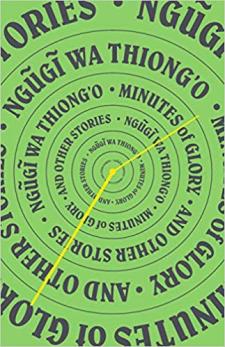 Covering the period of British colonial rule and resistance in Kenya to the bittersweet experience of independence—and including two stories that have never before been published in the United States— Ngũgĩ’s collection features women fighting for their space in a patriarchal society; big men in their Bentleys who have inherited power from the British; and rebels who still embody the fighting spirit of the downtrodden.
Covering the period of British colonial rule and resistance in Kenya to the bittersweet experience of independence—and including two stories that have never before been published in the United States— Ngũgĩ’s collection features women fighting for their space in a patriarchal society; big men in their Bentleys who have inherited power from the British; and rebels who still embody the fighting spirit of the downtrodden.
One of Ngũgĩ’s most beloved stories, “Minutes of Glory,” tells of Beatrice, a sad but ambitious waitress who fantasizes about being feted and lauded over by the middle-class clientele in the city’s beer halls. Her dream leads her on a witty and heartbreaking adventure.
Published for the first time in America, Minutes of Glory and Other Stories is a major literary event that celebrates the storytelling might of one of Africa’s best-loved writers.
Title: Minutes of Glory and Other Stories
Author: Ngugi wa Thiong’o
Publisher: New Press, The
Format Hardcover
224 pages
ISBN-10 1620974657
ISBN-13 9781620974650
Publication Date 01 March 2019
Hardcover – $24.95
# new books
Ngugi wa Thiong’o
Minutes of Glory and Other Stories
• fleursdumal.nl magazine
More in: #Short Stories Archive, - Book News, - Book Stories, Archive M-N, Art & Literature News, FDM in Africa
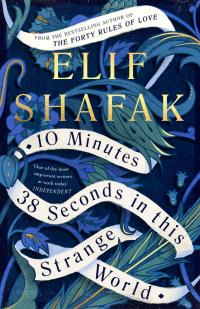 For Leila, each minute after her death brings a sensuous memory: the taste of spiced goat stew, sacrificed by her father to celebrate the long-awaited birth of a son; the sight of bubbling vats of lemon and sugar which the women use to wax their legs while the men attend mosque; the scent of cardamom coffee that Leila shares with a handsome student in the brothel where she works.
For Leila, each minute after her death brings a sensuous memory: the taste of spiced goat stew, sacrificed by her father to celebrate the long-awaited birth of a son; the sight of bubbling vats of lemon and sugar which the women use to wax their legs while the men attend mosque; the scent of cardamom coffee that Leila shares with a handsome student in the brothel where she works.
Each memory, too, recalls the friends she made at each key moment in her life – friends who are now desperately trying to find her. . .
Elif Shafak is an award-winning British-Turkish novelist and the most widely read female author in Turkey.
She writes in both Turkish and English, and has published seventeen books, eleven of which are novels. Her work has been translated into fifty languages. Shafak holds a PhD in political science and she has taught at various universities in Turkey, the US and the UK, including St Anne’s College, Oxford University, where she is an honorary fellow. She is a member of World Economic Forum Global Agenda Council on Creative Economy and a founding member of the European Council on Foreign Relations (ECFR). An advocate for women’s rights, LGBT rights and freedom of speech, Shafak is an inspiring public speaker and twice a TED global speaker, each time receiving a standing ovation.
Shafak contributes to many major publications around the world and she has been awarded the title of Chevalier des Arts et des Lettres. In 2017 she was chosen by Politico as one of the twelve people who would make the world better. She has judged numerous literary prizes and is chairing the Wellcome Prize 2019.
She lives in London and can be found at www.elifshafak.com
Twitter @Elif_Safak; Instagram @shafakelif
10 Minutes 38 Seconds in this Strange World
Elif Shafak (Author)
Hardcover
6 Jun 2019
320 pages
Publisher: Viking
Language: English
ISBN-10: 0241293863
ISBN-13: 978-0241293867
Dimensions: 13.8 x 2.7 x 20.4 cm
RRP: £14.99
# new books
Elif Shafak
10 Minutes 38 Seconds in this Strange World
• fleursdumal.nl magazine
More in: #Short Stories Archive, - Book News, - Book Stories, Archive S-T, Art & Literature News, PRESS & PUBLISHING, REPRESSION OF WRITERS, JOURNALISTS & ARTISTS
Ein elsässischer Soldat im Ersten Weltkrieg entdeckt am Nachthimmel das Sternbild des Großen Burschen, das so schauderhaft ist, dass er niemandem davon erzählen kann.
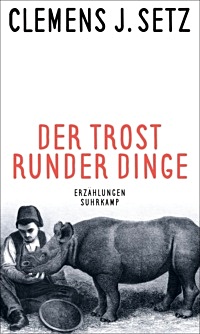 Ein junger Mann, der sich in die blinde Anja verliebt hat, muss feststellen, dass ihr Apartment von oben bis unten mit Beschimpfungen bekritzelt ist. Marcel, sechzehn Jahre alt, hinterlässt auf der Toilettenwand eines Erotiklokals seine Handynummer und den Namen Suzy.
Ein junger Mann, der sich in die blinde Anja verliebt hat, muss feststellen, dass ihr Apartment von oben bis unten mit Beschimpfungen bekritzelt ist. Marcel, sechzehn Jahre alt, hinterlässt auf der Toilettenwand eines Erotiklokals seine Handynummer und den Namen Suzy.
Familie Scheuch bekommt eines Tages Besuch von einem Herrn Ulrichsdorfer, der vorgibt, in ihrem Haus aufgewachsen zu sein, und einen Elektroschocker unter seinem geliehenen Anzugjackett verbirgt.
Das ganz und gar Unerwartete bricht in das Leben von Clemens J. Setz’ Figuren ein. Ihr Schöpfer erzählt davon einfühlsam, fast zärtlich. Durch Falltüren gestattet er uns Blicke auf rätselhafte Erscheinungen und in geheimnisvolle Abgründe des Alltags, man stößt auf Wiedergänger und auf Sätze, die einen mit der Zunge schnalzen lassen.
Der Trost runder Dinge ist ein Buch voller Irrlichter und doppelter Böden – radikal erzählt und aufregend bis ins Detail.
Clemens J. Setz wurde 1982 in Graz geboren, wo er Mathematik sowie Germanistik studierte und heute als Übersetzer und freier Schriftsteller lebt. 2011 wurde er für seinen Erzählband Die Liebe zur Zeit des Mahlstädter Kindes mit dem Preis der Leipziger Buchmesse ausgezeichnet. Sein Roman Indigo stand auf der Shortlist des Deutschen Buchpreises 2012 und wurde mit dem Literaturpreis des Kulturkreises der deutschen Wirtschaft 2013 ausgezeichnet. 2014 erschien sein erster Gedichtband Die Vogelstraußtrompete. Für seinen Roman Die Stunde zwischen Frau und Gitarre erhielt Setz den Wilhelm Raabe-Literaturpreis 2015.
Clemens J. Setz
Der Trost runder Dinge
Erzählungen
Erschienen: 11.02.2019
Gebunden
320 Seiten
ISBN: 978-3-518-42852-8
Suhrkamp Verlag AG
Mit Abbildungen
€ 24,00
# new books
Der Trost runder Dinge
Erzählungen
Clemens J. Setz
• fleursdumal.nl magazine
More in: #Short Stories Archive, - Book News, - Book Stories, Archive S-T, Art & Literature News, WAR & PEACE
In New American Stories, the beautiful, the strange, the melancholy, and the sublime all comingle to show the vast range of the American short story.
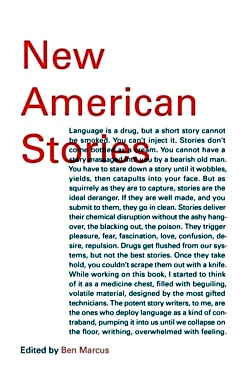 In this remarkable anthology, Ben Marcus has corralled a vital and artistically singular crowd of contemporary fiction writers.
In this remarkable anthology, Ben Marcus has corralled a vital and artistically singular crowd of contemporary fiction writers.
Collected here are practitioners of deep realism, mind-blowing experimentalism, and every hybrid in between.
Luminaries and cult authors stand side by side with the most compelling new literary voices.
Nothing less than the American short story renaissance distilled down to its most relevant, daring, and unforgettable works,
New American Stories puts on wide display the true art of an American idiom.
“Ben Marcus is the rarest kind of writer: a necessary one. It’s become impossible to imagine the literary world–the world itself–without his daring, mind-bending and heartbreaking writing.”–Jonathan Safran Foer
New American Stories
Edited by Ben Marcus
Part of Vintage Contemporaries
Category: Literary Collections | Literary Fiction
Paperback
2015
784 Pages
$16.95
Published by Vintage
ISBN 9780804173544
short storie
fleursdumal.nl magazine
More in: #Short Stories Archive, - Book News, - Book Stories, Archive M-N, Art & Literature News
Thank you for reading Fleurs du Mal - magazine for art & literature